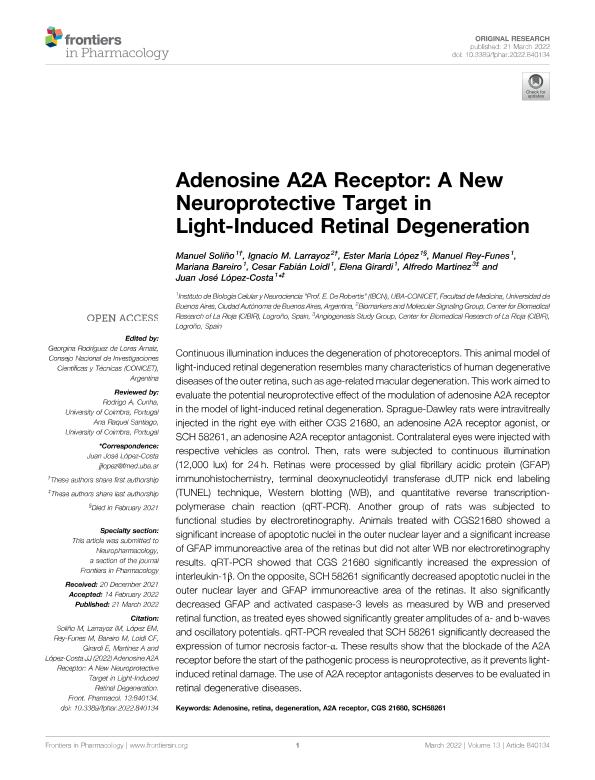Artículo
Adenosine A2A Receptor: A New Neuroprotective Target in Light-Induced Retinal Degeneration
Soliño, Manuel; Larráyoz, Ignacio M.; Lopez, Ester Maria ; Rey Funes, Manuel; Bareiro, Mariana; Loidl, Cesar Fabian
; Rey Funes, Manuel; Bareiro, Mariana; Loidl, Cesar Fabian ; Girardi, Elena Silvia
; Girardi, Elena Silvia ; Martínez, Alfredo; López, Juan José
; Martínez, Alfredo; López, Juan José
 ; Rey Funes, Manuel; Bareiro, Mariana; Loidl, Cesar Fabian
; Rey Funes, Manuel; Bareiro, Mariana; Loidl, Cesar Fabian ; Girardi, Elena Silvia
; Girardi, Elena Silvia ; Martínez, Alfredo; López, Juan José
; Martínez, Alfredo; López, Juan José
Fecha de publicación:
03/2022
Editorial:
Frontiers Media
Revista:
Frontiers in Pharmacology
ISSN:
1663-9812
Idioma:
Inglés
Tipo de recurso:
Artículo publicado
Clasificación temática:
Resumen
Continuous illumination induces the degeneration of photoreceptors. This animal model of light-induced retinal degeneration resembles many characteristics of human degenerative diseases of the outer retina, such as age-related macular degeneration. This work aimed to evaluate the potential neuroprotective effect of the modulation of adenosine A2A receptor in the model of light-induced retinal degeneration. Sprague-Dawley rats were intravitreally injected in the right eye with either CGS 21680, an adenosine A2A receptor agonist, or SCH 58261, an adenosine A2A receptor antagonist. Contralateral eyes were injected with respective vehicles as control. Then, rats were subjected to continuous illumination (12,000 lux) for 24 h. Retinas were processed by glial fibrillary acidic protein (GFAP) immunohistochemistry, terminal deoxynucleotidyl transferase dUTP nick end labeling (TUNEL) technique, Western blotting (WB), and quantitative reverse transcription-polymerase chain reaction (qRT-PCR). Another group of rats was subjected to functional studies by electroretinography. Animals treated with CGS21680 showed a significant increase of apoptotic nuclei in the outer nuclear layer and a significant increase of GFAP immunoreactive area of the retinas but did not alter WB nor electroretinography results. qRT-PCR showed that CGS 21680 significantly increased the expression of interleukin-1β. On the opposite, SCH 58261 significantly decreased apoptotic nuclei in the outer nuclear layer and GFAP immunoreactive area of the retinas. It also significantly decreased GFAP and activated caspase-3 levels as measured by WB and preserved retinal function, as treated eyes showed significantly greater amplitudes of a- and b-waves and oscillatory potentials. qRT-PCR revealed that SCH 58261 significantly decreased the expression of tumor necrosis factor-α. These results show that the blockade of the A2A receptor before the start of the pathogenic process is neuroprotective, as it prevents light-induced retinal damage. The use of A2A receptor antagonists deserves to be evaluated in retinal degenerative diseases.
Palabras clave:
A2A RECEPTOR
,
ADENOSINE
,
CGS 21680
,
DEGENERATION
,
RETINA
,
SCH58261
Archivos asociados
Licencia
Identificadores
Colecciones
Articulos(IBCN)
Articulos de INST.DE BIOLO.CEL.Y NEURCS."PROF.E.DE ROBERTIS"
Articulos de INST.DE BIOLO.CEL.Y NEURCS."PROF.E.DE ROBERTIS"
Citación
Soliño, Manuel; Larráyoz, Ignacio M.; Lopez, Ester Maria; Rey Funes, Manuel; Bareiro, Mariana; et al.; Adenosine A2A Receptor: A New Neuroprotective Target in Light-Induced Retinal Degeneration; Frontiers Media; Frontiers in Pharmacology; 13; 3-2022; 1-14
Compartir
Altmétricas



